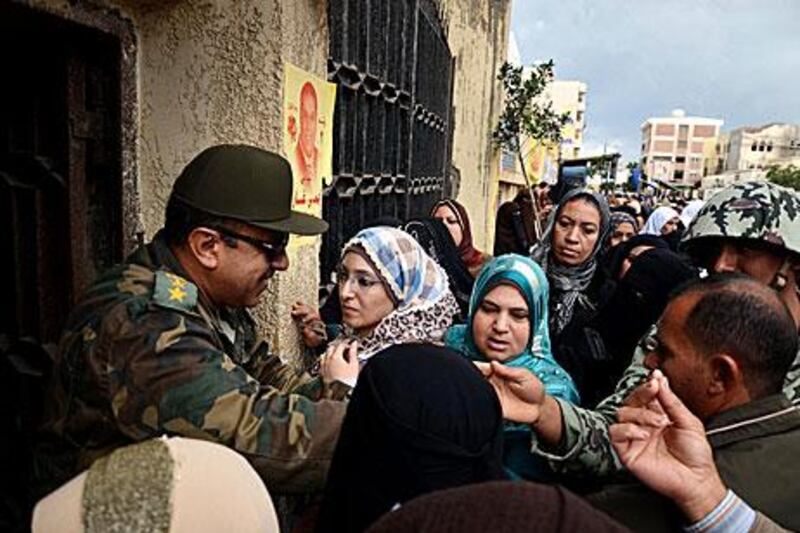ALEXANDRIA // It was a landmark election day in one of this seaside city's poorest slums and a group of young men held a loud, impromptu debate outside their local polling station.
"We need the army," said 19-year-old Islam Ali, referring to Egypt's interim military rulers.
"We don't need soldiers playing with our constitution," Mohamed Lofti, a 25-year-old accountant, charged back. They are both residents of Motazah, a muddy quarter of Alexandria known for its staunch support of ultra-Islamists.
Just a year ago, scenes like this - where youth openly and brazenly discuss national politics in Egypt's second-largest city - would have been unthinkable under the repressive rule of President Hosni Mubarak.
But 10 months after a popular revolt toppled the dictator who ruled for decades, Egyptians turned out in high numbers in nine of the country's 27 governorates to cast their ballots for a people's assembly that will draft a new constitution.
The remaining governorates will vote in December and January, choosing between a dizzying array of political parties, coalitions and independent candidates.
Despite last week's deadly clashes between police and protesters that left 43 dead and threatened to delay the polls, voters were enthusiastic and undeterred in both Alexandria and the capital, Cairo.
"This is my first election since Gamal Abdel Nasser," said a Cairo resident, Ramadan Abu El Hassan, 62, referring to Egypt's legendary president who died in 1970.
"I want my dignity… Nasser said Egyptians should keep their heads high."
In Alexandria, nestled on the sometimes-stormy Mediterranean, voters lined up for hours in pouring rain to have their voices heard.
More than 400 candidates are competing for eight individual seats, while 33 are contesting 10 seats in the governorate. Primary schools and youth centres were transformed into voting stations here and in the other nine governorates.
"I never imagined there would be a day like this, living for so long under Mubarak," said Ashraf Hassan, 50, an engineer.
Mr Hassan and his 19-year-old son, Galal, arrived in a downpour at 7:30am at their local polling station, only to find the line stretched around the block.
"I don't care," Mr Hassan said of the wait. "It's a miracle."
At a women's-only voting centre nearby, young and old, veiled and unveiled, also waited in queues that spanned entire streets.
Some analysts have described the elections as a battle between Islamist and secularist forces, but not all voters were so easily pegged.
"I don't want to vote for anyone who will implement Sharia law," said Abeer El Shorbaghy, a 25-year-old woman with a full veil.
"We are Christians and Muslims here, and we need a government and a law that satisfies and helps everyone."
Ivronia Helmi, however, a 24-year-old Coptic Christian, said she feared Islamist parties such as the Muslim Brotherhood's Freedom and Justice would come to power and impose a severe interpretation of Islamic law.
Indeed, the Freedom and Justice Party (FJP) is the favourite to win the most seats in parliament and therefore would hold the most sway over the drafting of the new constitution.
Also in Alexandria, the conservative Islamist Al Nour party holds strong support.
"I am voting for Tariq Talaat Moustafa, because he is moderate," Miss Helmi said.
Mr Moustafa, chairman of the Talaat Moustafa Group and a member of Mubarak's now-dissolved National Democratic Party, is what many here call "felool", or a "remnant" of the old regime.
Many ex-NDP members have formed new parties or are running as independents in the parliamentary elections. Over the past 10 months of transition, protesters and activists have demanded they be banned from vying for office.
"He is a bad man. He is corrupt," says 21-year-old Marwan Yassin, a political activist in Alexandria, of Mr Moustafa.
"How can this parliament be legitimate if we allow Mubarak and his friends to be in the government?"
Another divisive issue on voters' minds was the recent violence in Cairo's Tahrir Square, which was championed by leftist and liberals but rejected by the Muslim Brotherhood and other Islamists.
In Cairo, Abdel Hakim, 44, said the elections were meant to build unity in a country that has been increasingly divided since the toppling of Hosni Mubarak in February.
"This is to have a parliament that represents us instead of the everlasting demonstrations in Tahrir Square," he said. "The people in Tahrir are our brothers, sons and friends, but we are having very different thoughts."
An organiser for the Muslim Brotherhood's FJP in Alexandria, Tarek Bareekhy, 40, denounced the Tahrir protesters as he watched voters enter the polling station under a large, yellow party banner.
"We all went to Tahrir, but we will not fight the police," Mr. Bareekhy said.
"The number of people you see here is evidence enough that Egyptians want to solve their problems peacefully at the ballot box," he continued. "And not in Tahrir."
[ foreign.desk@thenational.ae ]
* With additional reporting by Bradley Hope in Cairo





